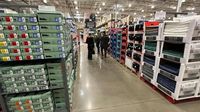Consumer confidence in the United States has taken a hit, falling for the fourth consecutive month as anxiety about the financial future reaches a twelve-year low. As reported by the Conference Board on March 25, 2025, the consumer confidence index dropped 7.2 points to a reading of 92.9, falling short of analysts’ expectations of 94.5.
This decline coincides with a worrying rise in inflation that, despite having lessened from its post-pandemic peaks, still hovers above the Federal Reserve's target of 2%. Compounding these economic concerns, the Trump Administration’s tariffs on imported goods have further strained American consumers' outlook, pushing them to rethink their spending habits.
More specifically, the Conference Board’s report indicated significant declines in Americans’ short-term expectations for income, business, and the job market, which fell 9.6 points to a troubling 65.2—the lowest reading in over a decade. Experts indicate that a score below 80 can hint at an impending recession, and the proportion of consumers predicting a recession in the coming year remains at a nine-month high.
Stephanie Guichard, a senior economist at the Conference Board, commented on the situation, stating, “Consumers’ optimism about future income—which had held up quite strongly in the past few months—largely vanished, suggesting worries about the economy and labor market have started to spread into consumers’ assessments of their personal situations.”
Consumer spending is critical to U.S. economic activity, accounting for roughly two-thirds of the nation’s economic output. As such, shifts in consumer sentiment are closely monitored by economists. Recent retail sales data reflect this anxiety; January saw a sharp drop in retail sales, although there was a sign of recovered spending in February, as Americans modestly increased their expenditures following a significant pullback.
Further highlighting the economic landscape, Wall Street futures showed flat movement on the same day, March 25, as traders reacted to the complex trade policies of the Trump administration, particularly relating to possible new tariffs on automobiles. S&P 500, Nasdaq, and Dow Jones futures remained close to the previous day's finishes, indicating a cautious yet less optimistic trading environment.
This trade uncertainty is reflected in the actions of various companies, including McCormick (MKC), whose shares fell 3.5% in pre-bell trading after the company reported first-quarter earnings that were below expectations. Similarly, energy prices showed fluctuations, with West Texas Intermediate crude oil trading up to $69.53 per barrel, exhibiting a 0.6% increase.
Meanwhile, the agricultural and commodities sectors are also grappling with their own uncertainties. The Case-Shiller Home Price Index and the Federal Housing Finance Agency House Price Index, both set for release shortly and concerning January figures, further paint a picture of economic concerns affecting multiple sectors.
In this climate, economist and Federal Reserve officials are warning about the implications of weakened consumer confidence. According to reports, consumer confidence shrank with consumers’ perception of current economic conditions also dipping 3.6 points to 134.5.
Amid these challenges, tech sector stocks, such as those of Mural Oncology, fell drastically—marking a drop of over 48% before the Tuesday opening bell after the company announced it was halting development on a crucial cancer treatment due to poor trial results.
In a similar vein, consumer tech stocks fluctuated, with firms like Smithfield Foods reporting positive quarterly results—a 2% increase in stock prices—but companies like Qifu Technology faced a downturn, with shares down more than 3% following a new offering of convertible senior notes.
The health care sector faced mixed results as well, with the Health Care Select Sector SPDR Fund declining slightly while biotechnology stocks showed minor gains. The direction of these markets is clouded by consumers’ shrinking confidence and ongoing tariff discussions.
In summary, the current economic outlook is fraught with concern, as consumer confidence erodes amid persistent inflation, trade tariffs, and an uncertain job market. Economists warn that if these trends continue, the repercussions for the U.S. economy could be severe—heightening fears of a looming recession as consumer spending influences economic growth significantly.





